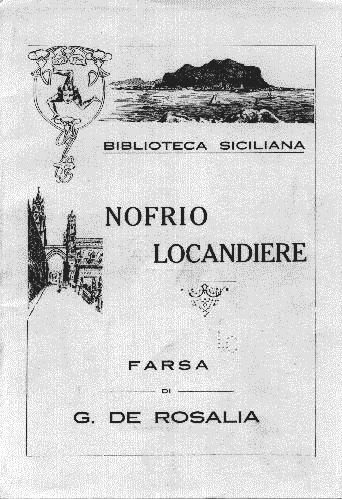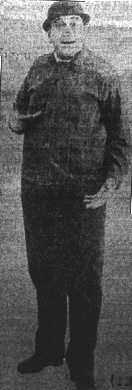 |
Images of Giovanni De Rosalia: Playwright,
Poet, and "Nofrio"
by Joseph J. Accardi *
Giovanni De Rosalia, born in
Sicily in 1864, moved to New York City sometime before 1907 where he
became popular among Italian immigrants in the Teatro Italiana di
Varietà. His original farces featured the character
Nofrio, a Sicilian immigrant bumpkin who found himself embroiled in
one situation after another. De Rosalia played the role of Nofrio in
addition to authoring and directing the plays. Between 1916 and
1928, he recorded nearly two hundred of his popular skits. Those
recordings sold nationwide and gained him a loyal following. He
published numerous plays and farces, as well as a few collections of
poetry during his lifetime. Nofrio's legacy is preserved only in
special library archives and in private collections. I hope you
enjoy these images gathered from my research, which began with a handful
of 78 r.p.m. Nofrio recordings from my grandfather's
collection. |
| In 1907,
De Rosalia began to recruit actors for a classical drama
company. He abandoned "serious" theatre after a while, but continued
his pursuits as a Sicilian dialect actor and writer, creating "siciliana
newyorkese" farces, featuring Nofrio as the
protagonist. |
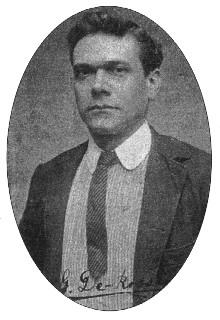 |
Many of De
Rosalia's Nofrio skits were published by La Follia di New York, a
popular Italian American entertainment newspaper. Though only a
handful of these works still exist today, they constitute a significant
contribution to the literature of Italian American
theatre. |
| The
popularity of Nofrio and his antics reached its peak during the
mid-1920's. Giovanni De Rosalia & Company appeared frequently in
various theaters around New York's immigrant district. His troupe
provided hours of entertainment to enthusiastic fans who crowded the
playhouse nightly. The following theatrical review is from a 1925
edition of Il Progresso Italo-Americano
newspaper:
“Alle Teatro 14
Strade. Oggi si repete la brillantissima commedia dal titolo ‘Nofrio
sensalè di matrimonio’ che ieri sera attiro una folla enorme.
Giovanni De Rosalia con la sua compagnia fu
applauditissimo.”
(At the 14th Street
Theatre. Today the brilliant comedy entitled “Nofrio the Matchmaker”
is repeated that last night attracted an enormous crowd. Giovanni De
Rosalia with his company was applauded most
enthusiastically.)
The troupe would
perform continuous shows, sometimes going from 8:30 p.m. until 2:00 a.m.,
featuring music, dance and an occasional film. |
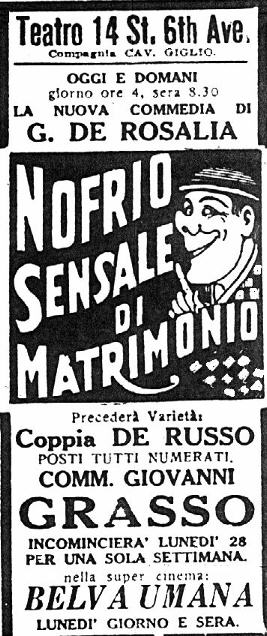 |
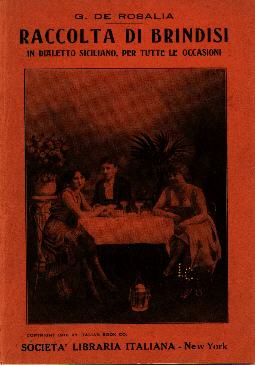 |
Not only a
talented playwright and actor, De Rosalia was also a skilled poet who
published some collections of Sicilian and Italian verse. Among his
early works was a book entitled Raccolta di brindisi per ogni occasione
in dialetto siciliano (A collection of toasts for all occasions in
Sicilian dialect). Written in verse, some are clever tributes for
holidays like Easter or Christmas. Others are poignant toasts for
special occasions such as weddings and the like. This collection of
toasts was published in 1916.
A major work, Amuri
chi chianci: versi siciliani (Love that cries), was published in
1923. |
| De Rosalia
was very successful in making his farces widely available on disc,
recording nearly two hundred titles between 1916 and 1928. These
were not the full-length sketches he and his company performed on stage,
but instead were skits pared down to about three minutes each and
featuring only two or three characters to advance the plot quickly for the
78 r.p.m. format.
For a brief time in
the early 1920’s, De Rosalia even issued records on his own “Nofrio”
label. |
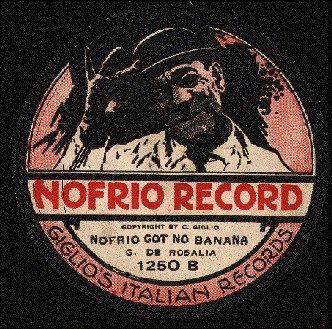 |
 |
Most of
Nofrio's two hundred recorded farces were made on the Columbia, Victor,
and Okeh record labels. These ethnic recordings are now quite rare
and few have survived over the years. A favorite one is
Nofrio Spara Lu Jocu di Focu (Nofrio shoots off his fireworks),
recorded in 1923 on the Columbia label and pictured here in its jacket
cover.
Giovanni De Rosalia
died in 1934. Today, only a few of his works, printed and recorded,
can be found in private collections and library
archives. |
* The full version of "Giovanni De
Rosalia:
Playwright, Poet, and Nofrio" by Joseph J. Accardi has been published in the
Summer 2001 issue of Italian
Americana (Vol. XIX, No. 2, p176-200). Italian
Americana is a semi-annual historical & cultural journal devoted to the
Italian experience in America, and is published in cooperation with the
University of Rhode Island and the American Italian Historical
Association.
Acknowledgements:
Il Progresso
Italo-Americano. (New York: Barsotti & Polidori). Newspaper
published 1880-1989.
Spottswood, Richard K.,
Ethnic Music on Records: A Discography of Ethnic Recordings Produced in the
United States, 1893 to 1942. Volume 1, Western Europe. (Chicago:
University of Illinois Press, 1990)
Very special thanks
to Art Dieli, Sicilian language scholar, for his translations and
enthusiasm. Thanks also to J. Kirk Bonner, Sicilian language scholar, for
his interest.
Special thanks to
Dr. Emelise Aleandri, author of The Italian-American Immigrant Theatre of New
York City (Charleston, SC:
Arcadia, 1999) and Little Italy
(Charleston, SC: Arcadia, 2002) for her advice and contributions.
Emelise is the Artistic Director for Frizzi & Lazzi, The Olde Time
Italian-American Music & Theatre Company (http://www.frizzilazzi.com/) in New York
City. Nofrio Locandierie was staged by Frizzi & Lazzi in NYC on
February 11, 2003 for a fund raising program called Love Sicilian Style on
behalf of the American Italian Cultural Roundtable, Inc.
And a heartfelt
thanks to my aunts Sadie and Liz for saving grandpa's records.
© Joseph J. Accardi
Update: May 2010
Back to Prima
Pagina






